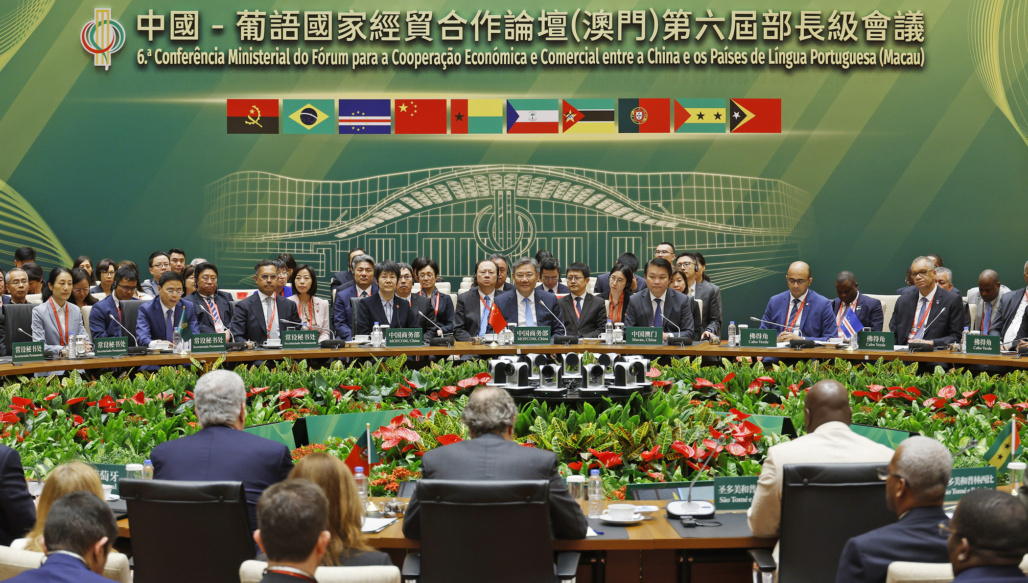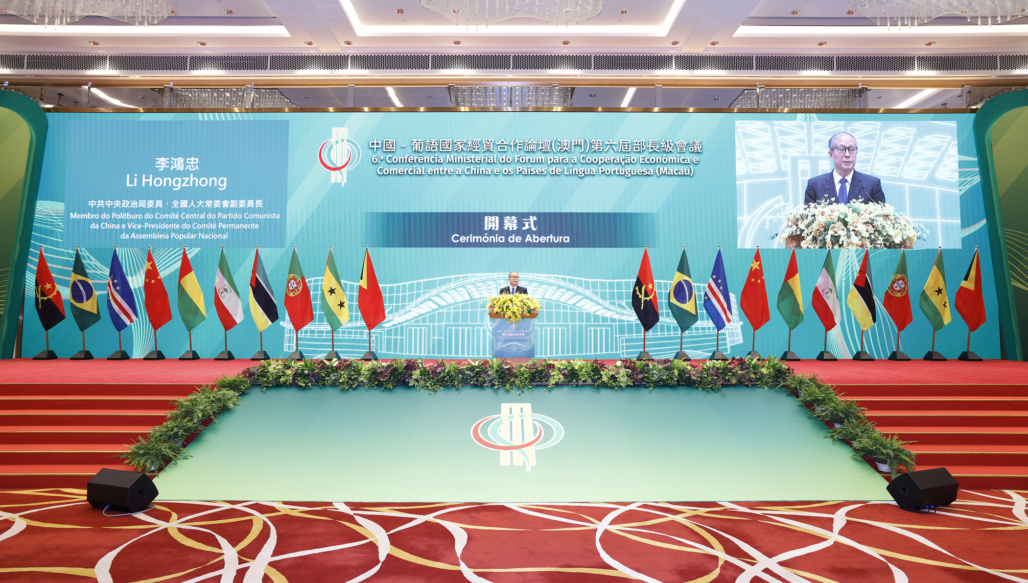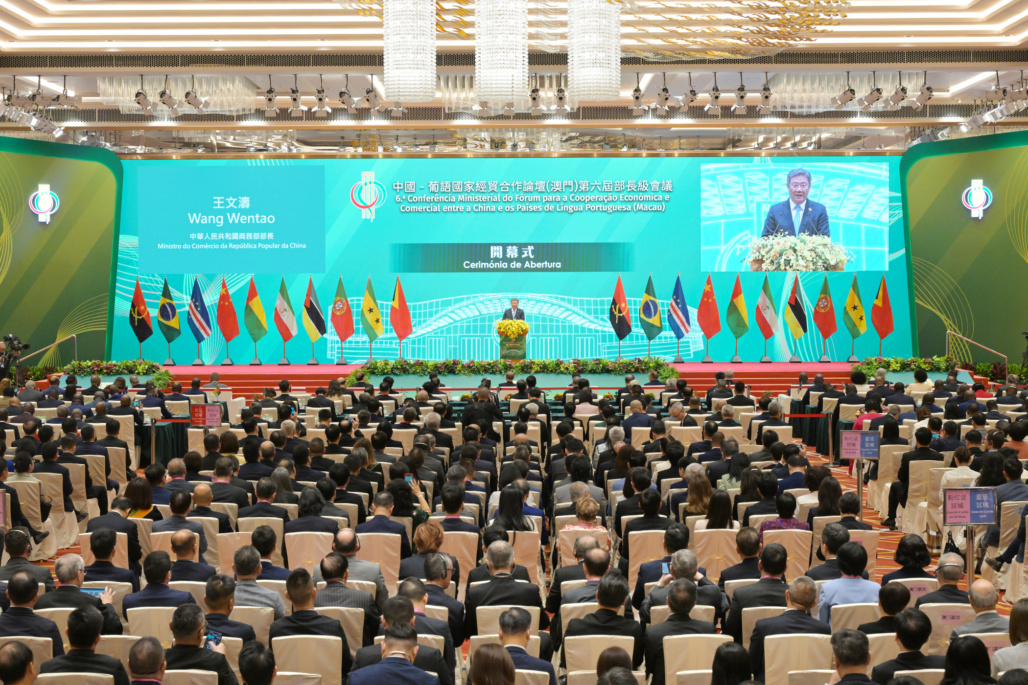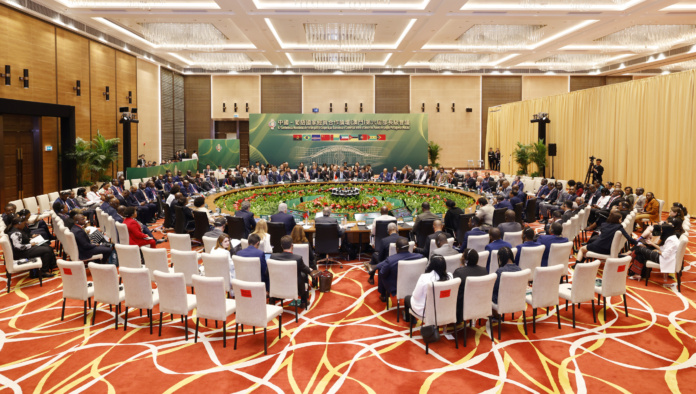After several delays, the 6th Forum Macau Ministerial Conference finally took place last month, almost eight years since its last convening in 2016. Despite fewer top officials in attendance compared to the previous edition, the conference still served as a launching pad for China’s vision of Sino-Lusophone cooperation, outlining its aspirations at least until 2027.
Nelson Moura
The 6th ministerial conference of Forum Macau concluded this week, marking a significant milestone after an eight-year hiatus since its last edition. Representatives from Portuguese-speaking countries gathered to discuss the future of Sino-Lusophone cooperation until 2027, with Chinese authorities unveiling a new Action Plan focusing on the digital economy, blue economy, health, and environment.
Five ministerial conferences were held in the SAR in 2003, 2006, 2010, 2013, and 2016, during which action plans for Economic and Commercial Cooperation were approved. Initially scheduled for 2019, the sixth ministerial conference, which ended on Tuesday, was postponed to June 2020 due to the Macau Chief Executive election. However, due to the COVID-19 pandemic, it ultimately did not take place. Nine Portuguese-speaking countries were represented, namely Angola, Brazil, Cape Verde, Guinea-Bissau, Equatorial Guinea, Mozambique, Portugal, São Tomé and Príncipe, and Timor-Leste.
However, unlike eight years ago when some top officials were present, including China’s Premier Li Keqiang and Portugal’s Prime Minister António Costa, the attendance this year was more modest. Both the Chinese and Lusophone sides mainly appointed ministers linked to the economy to attend the conference.

Guests bearing gifts
During the conference, the Vice Chairman of the Standing Committee of the National People’s Congress, Li Hongzhong, announced twenty measures aimed at elevating economic and commercial cooperation between China and Portuguese-speaking countries.
In total, Portuguese-speaking countries registered 6.2 percent year-on-year growth in exports to China in 2023, posting a record full-year tally of US$147.5 billion.
Brazil, however, accounted for an unprecedented US$122.4 billion in sales to China, up nearly 12 percent from the previous year, cementing its spot as China’s top lusophone trade partner.
Overall, total trade between Portuguese-speaking countries totaled US$220.9 billion, with China experiencing a record trade deficit of US$74.1 billion with the Portuguese-speaking nine-country group.
Chinese exports dropped 3.5 percent to US$73.4 billion, around 80 percent of which went to Brazil, which purchased US$59.1 billion, followed by Portugal with US$5.79 billion.

The measures disclosed during the 6th Forum Macau Ministerial Conference span trade and investment cooperation, industrial collaboration, economic assistance, and health initiatives, among others. Li reassured delegates of China’s commitment to reform and opening up, emphasising continued efforts to promote openness and cooperation.
Overall, these policies include encouraging the participation of companies from Portuguese-speaking countries in major exhibitions such as the China International Import Expo, as well as providing export credit insurance to stimulate imports. The simplification of inspection and quarantine processes for food and agricultural products from these countries, coupled with the development of a trade and investment manual, seeks to streamline trade and enhance policy exchange. Additionally, efforts to modernise agricultural demonstration centres, conduct joint research projects, and facilitate air transport agreements aim to foster personal exchange and bolster cooperation.
Support measures extend to economic development planning and collaboration in various sectors, including agriculture, health, culture, transportation, and infrastructure, in Portuguese-speaking countries in Asia and Africa. Providing training opportunities for students from these countries in China, along with internship support in Macau, aims to enhance educational and professional exchange. Furthermore, initiatives to strengthen cooperation between Chinese and Portuguese-speaking country hospitals, conduct short-term health projects, and train traditional medicine professionals demonstrate a commitment to improving healthcare infrastructure in Portuguese-speaking countries.
Efforts to establish a financial services platform, develop an international securities market, and create a platform for scientific and technological cooperation underscore a broader commitment to advancing cooperation across sectors, particularly in areas such as audiovisual. These measures aim to facilitate financial transactions, enhance investment opportunities, and promote technological innovation and collaboration between China and Portuguese-speaking countries.
Meanwhile, China’s Commerce Minister, Wang Wentao, also mentioned that China has signed cooperation agreements related to the joint creation of the “Belt and Road Initiative” with most Lusophone countries.
He affirmed that the Ministry of Commerce will earnestly implement the eight actions announced by President Xi Jinping to ensure the high-quality development of this strategy, aiming to better align it with the Forum’s development.
Wang also expressed China’s willingness to work with PLP to enhance trade and investment facilitation, deepen openness and cooperation in the industrial and supply chain, support welfare projects, and continuously enrich and improve the Macau Forum mechanism, aiming to foster a new model of multi-level cooperation.

Compliments and suggestions
Despite delays caused by the COVID-19 pandemic, the conference witnessed active participation from nine Portuguese-speaking countries. Lusophone representatives praised China’s intentions but urged greater agility and utilisation of the Forum’s financial instruments. Requests focused on easing entry measures for entrepreneurs and maximising the use of the Sino-Lusophone Fund.
Pedro Reis, the Minister of Economy of Portugal, emphasised the importance of a joint reflection on existing financing mechanisms, particularly highlighting the China-Portuguese Speaking Countries Cooperation and Development Fund. Established in 2013, the Fund invested approximately US$500 million in projects across Portuguese-speaking countries, spanning various sectors including clean energy, infrastructure, and agriculture.
Moreover, reinforcement measures outlined during the conference aim to enhance cooperation between China and Portuguese-speaking countries, encompassing initiatives such as trade promotion, agricultural modernization, and support for student exchange programs. The measures also include the creation of a financial services platform and a scientific cooperation platform between China and Portuguese-speaking countries.
The conference concluded with optimism for strengthened cooperation between China and Portuguese-speaking countries, driven by shared goals and reinforced by concrete measures outlined in the new Action Plan.
The executive secretary of the Brazilian Ministry of Entrepreneurship, Microenterprise, and Small Business, Francisco Tadeu Barbosa de Alencar, indicated during the conference that, as the most important trading partner of the South American country, the relationship with China is of utmost importance to Brazilian President Lula da Silva. Alencar also indicated that the appointment of a permanent delegate from Brazil to the Macau Forum would be considered, a position that remains unfilled.
























